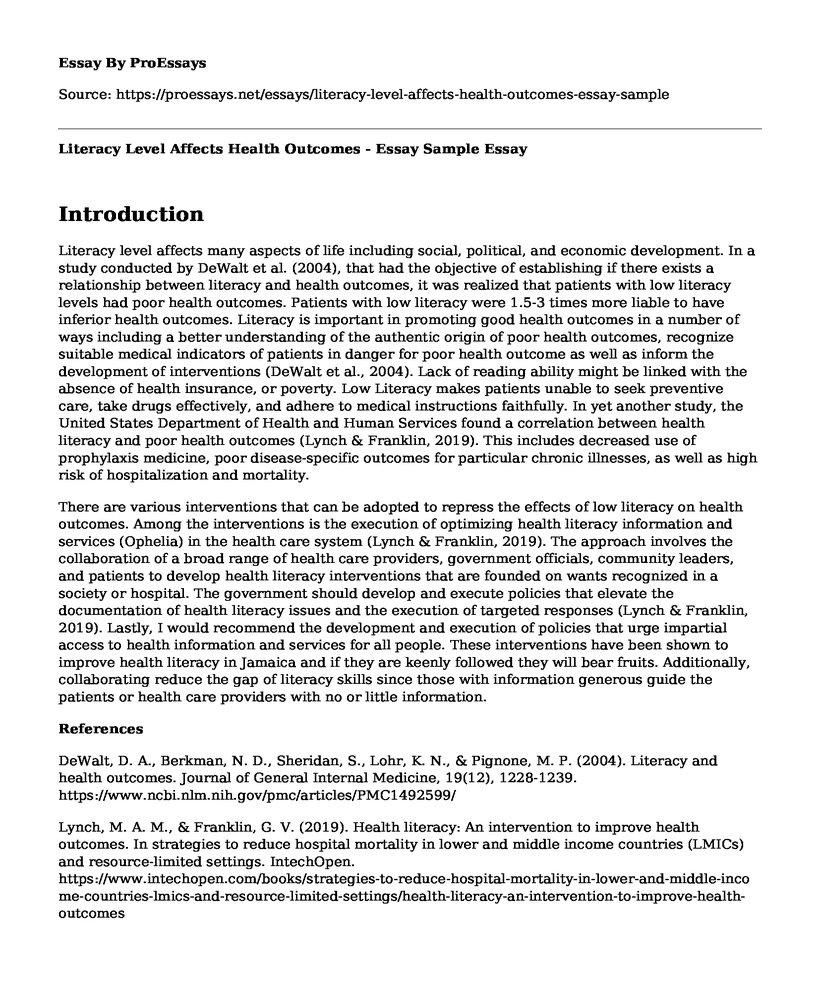Introduction
Literacy level affects many aspects of life including social, political, and economic development. In a study conducted by DeWalt et al. (2004), that had the objective of establishing if there exists a relationship between literacy and health outcomes, it was realized that patients with low literacy levels had poor health outcomes. Patients with low literacy were 1.5-3 times more liable to have inferior health outcomes. Literacy is important in promoting good health outcomes in a number of ways including a better understanding of the authentic origin of poor health outcomes, recognize suitable medical indicators of patients in danger for poor health outcome as well as inform the development of interventions (DeWalt et al., 2004). Lack of reading ability might be linked with the absence of health insurance, or poverty. Low Literacy makes patients unable to seek preventive care, take drugs effectively, and adhere to medical instructions faithfully. In yet another study, the United States Department of Health and Human Services found a correlation between health literacy and poor health outcomes (Lynch & Franklin, 2019). This includes decreased use of prophylaxis medicine, poor disease-specific outcomes for particular chronic illnesses, as well as high risk of hospitalization and mortality.
There are various interventions that can be adopted to repress the effects of low literacy on health outcomes. Among the interventions is the execution of optimizing health literacy information and services (Ophelia) in the health care system (Lynch & Franklin, 2019). The approach involves the collaboration of a broad range of health care providers, government officials, community leaders, and patients to develop health literacy interventions that are founded on wants recognized in a society or hospital. The government should develop and execute policies that elevate the documentation of health literacy issues and the execution of targeted responses (Lynch & Franklin, 2019). Lastly, I would recommend the development and execution of policies that urge impartial access to health information and services for all people. These interventions have been shown to improve health literacy in Jamaica and if they are keenly followed they will bear fruits. Additionally, collaborating reduce the gap of literacy skills since those with information generous guide the patients or health care providers with no or little information.
References
DeWalt, D. A., Berkman, N. D., Sheridan, S., Lohr, K. N., & Pignone, M. P. (2004). Literacy and health outcomes. Journal of General Internal Medicine, 19(12), 1228-1239. https://www.ncbi.nlm.nih.gov/pmc/articles/PMC1492599/
Lynch, M. A. M., & Franklin, G. V. (2019). Health literacy: An intervention to improve health outcomes. In strategies to reduce hospital mortality in lower and middle income countries (LMICs) and resource-limited settings. IntechOpen. https://www.intechopen.com/books/strategies-to-reduce-hospital-mortality-in-lower-and-middle-income-countries-lmics-and-resource-limited-settings/health-literacy-an-intervention-to-improve-health-outcomes
Cite this page
Literacy Level Affects Health Outcomes - Essay Sample. (2023, Aug 12). Retrieved from https://proessays.net/essays/literacy-level-affects-health-outcomes-essay-sample
If you are the original author of this essay and no longer wish to have it published on the ProEssays website, please click below to request its removal:
- Language Contact and Loan Vocabulary in Maltese Language from Arabic and English
- Problem Affecting University Students in Hong Kong Essay Example
- A) What effect is Anzaldua showing readers of mixing English and Spanish?
- Essay on Young Dreamer's Mission to Become a Doctor: A Journey of Dedication, Empathy, and Curiosity
- Conducting Community Health Assessments: Leveraging Data for Decisions
- Free Essay Example on Improve Your Nursing Practice with Evidence-Based Practices
- Paper on Improving Stroke Rehabilitation: Assessing Nurses' Integration After Educational Initiative







